Fortress Press Hebrew Bible Collection (11 vols.)
Digital Logos Edition
Overview
The Old Testament sets the stage for the coming of Jesus and the birth of the church. From the stories of creation and the fall, bondage and freedom, covenant, land, and exile—it outlines the events and themes which shape Christian theology. Yet the Old Testament is under-studied and infrequently preached on.
With this massive collection, you can examine the theology, history, and culture of Israel. Enter into the worldview of the Israelite community. Discover the beliefs and practice of early Judaism. Hear the stories of kings, prophets, and patriarchs. Most important, use this collection to enrich and deepen both your preaching and study of the Old Testament.
This collection demonstrates the importance of the Old Testament for the church and the world today. It contains important contributions to Old Testament scholarship—from overarching histories, syntheses, and examinations of large themes, to focused, intensive studies. Massive collection contains classics, such as Brevards S. Childs’ Introduction to the Old Testament as Scripture. It also features some of the most important recently-published works in the field, like Walter Brueggemann’s An Unsettling God: The Heart of the Hebrew Bible.

- 11 titles with information on the Hebrew Bible
- Time line, glossary of terms, maps and illustrations
- List of illustrations and abbreviations used
- Ideal for pastors and students
- Title: Fortress Press Hebrew Bible Collection
- Publisher: Augsburg Fortress
- Volumes: 11
- Pages: 3,815
- Resource Type: Monographs
- Topic: Hebrew Bible
- The Hebrew Bible: A Comparative Approach by Christopher D. Stanley
- The Hebrew Bible: A Brief Socio-Literary Introduction by Norman K. Gottwald and Rebecca J. Kruger Gaudino
- A Short Introduction to the Hebrew Bible by John J. Collins
- A Social History of Ancient Israel: An Introduction by Rainer Kessler
- Common Judaism: Explorations in Second-Temple Judaism edited by Wayne O. McCready and Adele Reinhartz
- Introduction to the Old Testament as Scripture by Brevard S. Childs
- The Yahwist’s Landscape: Nature and Religion in Early Israel by Theodore Hiebert
- The Green Psalter: Resources for an Ecological Spirituality by Arthur Walker-Jones
- An Unsettling God: The Heart of the Hebrew Bible by Walter Brueggemann
- The Word Militant: Preaching a Decentering Word edited by Walter Brueggemann
- Reading the Hebrew Bible After the Shoah: Engaging Holocaust Theology by Marvin A. Sweeney
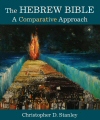
In The Hebrew Bible: A Comparative Approach, Christopher D. Stanley provides a Hebrew Bible textbook admirably suited to college and university courses in religious studies.
At once accessible and comprehensive, The Hebrew Bible approaches the Bible through the categories of comparative religion, carefully distinguishing the religion of ancient Israel from the religion represented in the Bible and discussing such dimensions of religion as the role of scripture, symbol and worldview, sacred narrative (myth), ritual and community, and the encounter with the holy.
Bravo! Finally, here is a thoughtful textbook on the Hebrew Bible and its context from the perspective of religious studies. This is a book that—without compromising academic rigor—caters to real students of the twenty-first centruy embarking on a semester-long course...
—Johanna Stiebert, associate professor of Hebrew Bible, University of Tennessee
Christopher D. Stanley is professor of theology and teaches courses in biblical studies and religion and culture at St. Bonaventure University. He is the author of numerous books and articles in biblical studies, including Paul and the Language of Scripture and Arguing with Scripture: The Rhetoric of Quotations in the Letters of Paul.
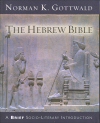
One of the pioneers of the socioliterary study of the Hebrew Bible introduces the beginning student to the social forces that shaped ancient Israel’s history and scriptures. Norman K. Gottwald brings new light to every book of the Hebrew Bible, and to the older traditions and sources on which those writings in part depend, paying particular attention to the rise and fall of empires and the social revolution achieved in Israel’s beginnings.
Rebecca J. Kruger Gaudino has prepared a clear and concise abridgement of Gottwald’s classic textbook, now thoroughly updated and lavishly illustrated with maps, diagrams, and photos.
Gottwald’s introduction takes you into the world from which the Hebrew Bible emerges. He recreates the full sweep of empires and shows how their literary traditions shape the literary traditions of the Hebrew Bible. . .
—Steed V. Davidson, assistant professor of Old Testament, Pacific Lutheran Theological Seminary
Norman K. Gottwald is professor of Old Testament emeritus at New York Theological Seminary. He is the author of numerous works, including The Tribes of Yahweh, All the Kingdoms of the Earth, A Light to the Nations, and The Politics of Ancient Israel.
Rebecca J. Kruger Gaudino is an ordained minister in the United Church of Christ and holds a doctorate in English.
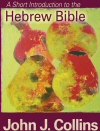
John J. Collins’ Introduction to the Hebrew Bible is a leading textbook in Old Testament studies. With this new, well-tailored abridgement of that larger work, Collins’ erudition is now available to general readers and professors and students who prefer a shorter, more concise introduction to the Hebrew scriptures. Also includes new maps, images, and study questions that are especially designed for the college student.
A balanced and richly informative introduction that covers essential critical and comparative perspectives and sets up pertinent interpretive issues, leaving the instructor free to work with the class in any number of directions...This is a textbook written by someone who not only knows his students but who genuinely likes them—and likes to challenge them!
—Carol Newsom, professor of Old Testament, Candler School of Theology
John J. Collins is Holmes Professor of Old Testament Criticism and Interpretation at Yale Divinity School and author of many works, including Introduction to the Hebrew Bible.
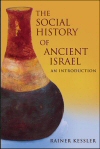
Histories of ancient Israel have usually focused attention on major figures in powerful positions: kings, prophets, and patriarchs. Kessler asks about the larger social patterns that shaped the everyday life of ordinary people, from the emergence of Israel in the hills of Canaan, to the Jewish populations of Greek city-states in the Hellenistic age.
The introductory section includes discussion of social history as discipline and as method, event history and the “long haul,” the representation of social history, and the history of research. Two other sections explore the methods of the social history of Israel and the epochs of Israel’s social history, including discussions of environment as living space, Israel’s emergence as a kinship-based society, exile and its consequences, and more.
The Social History of Ancient Israel presents a coherent overarching social history that synthesizes the intensive work done on each of the major epochs of Israelite history from the tribal period to the Hellenistic era. It also helps to close the gap between continental and Anglo-American social critics of the Bible whose respective pursuits have not been widely shared with one another to date.
—Norman K. Gottwald, professor of biblical studies emeritus, New York Theological Seminary
Rainer Kessler is professor of Old Testament at the University of Marburg and author of a number of books in Hebrew Bible.
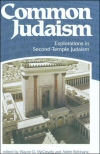
Two decades after the publication of E.P. Sanders’ monumental Judaism: Practice and Belief inaugurated vigorous debates about the extent and significance of commonality and diversity in ancient Judaism, Common Judaism gathers a host of scholars to present the state of our understanding of what was common ground in Second-Temple Judaism.
By examining the tensions between a “common Judaism” and local settings, partisan Judaism, and the influence of Hellenism, these essays set contemporary discussion on a secure footing. An important resource for scholars and students alike, the contributors include: Lee I. Levine, Susan Haber, Al Baumgarten, David Miller, Eliezer Segal, and many more. Including an introductory essay by E.P. Sanders, this has become a standard reference work in the fields of early Judaism and New Testament studies.
Wayne O. McCready is professor of western religions and director of the Calgary Institute for the Humanities at the University of Calgary.
Adele Reinhartz is dean of graduate studies and research, and professor in the Department of Religion and Culture, Wilfrid Laurier University, Waterloo, Ontario. She is coeditor of Jesus, Judaism, and Christian Anti-Judaism: Reading the New Testament after the Holocaust.
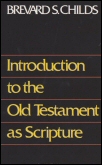
This introduction attempts to offer a different model for the discipline from that currently represented. It seeks to describe the form and function of the Hebrew Bible in its role as sacred scripture for Israel. It argues the case that the biblical literature has not been correctly understood or interpreted because its role as religious literature has not been correctly assessed.
Child’s Introduction stands as a monumental contribution to Old Testament scholarship. It will be, appropriately, a significant factor in biblcial studies for at least the balance of this century.
—John F. Priest, author
Brevard S. Childs is Sterling Professor of Divinity, Emeritus at Yale Divinity School, New Haven, Connecticut. He is the author of several Augsburg Fortress books: Introduction to the Old Testament as Scripture, Old Testament Theology in a Canonical Context, and Biblical Theology of the Old and New Testaments.
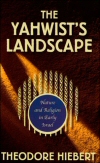
Hiebert’s foundational study opens the world of nature as a major aspect of biblical thought. It lays to rest the traditional dichotomy between nature and history that has been so long read into the Bible and Israel’s religion, redeeming the natural world as the realm of human life and God’s care.
Professor Theodore Hiebert has written a ‘must read’ book for biblical scholars and their students, for the clergy and well-informed laity. . .
—Larry Stager, professor of archaeology of Israel, Harvard University
Theodore Hiebert is the Francis A. McGaw Professor of Old Testament at McCormick Theological Seminary in Chicago. He is the author of essays on biblical perspectives on nature in The New Interpreter’s Dictionary of the Bible, The Oxford Companion to the Bible, and The Anchor Bible Dictionary.

Concern for the earth and biblical faith have had an uneasy relationship. Ecological theologians have often cited biblical themes of dominion or “mastery” over the land as contributing to our present environmental crisis. Walker-Jones explores important genres and metaphors in the Psalms for earth, the environment, and living things, while tracing their influence in contemporary culture, for example, in recent films. He shows that the Psalms, like the earth that is our home—can be dangerous but also provide wonderful resources for life.
The psalmists embrace the world of creation as essential in the journey of persons of faith, and Arthur Walker-Jones introduces readers to this journey. This book should be read by all who wish to explore biblical resources for a new ecological worldview.
—Theodore Hiebert, professor of Old Testament, McCormick Theological Seminary
Arthur Walker-Jones is associate professor of theology at the University of Winnipeg and cochair of the Academic Teaching and Biblical Studies Section of the SBL. His writings include Hebrew for Biblical Interpretation.
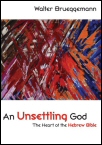
In the pages of the Hebrew Bible, ancient Israel gave witness to its encounter with a profound and uncontrollable reality experienced through relationship. This book, drawn from the heart of foremost Old Testament theologian Walter Brueggemann’s Theology of the Old Testament, distills a career’s worth of insights into the core message of the Hebrew Bible. God is described there, Brueggemann observes, as engaging four “partners”–Israel, the nations, creation, and the human being–in the divine purpose. This volume presents Brueggemann at his most engaging, offering profound insights tailored especially for the beginning student of the Hebrew Bible.
A luminous and honest reading of the relationality that animates the Hebrew Scriptures. Brueggemann’s masterful exposition of the fragility and resilience of covenant will leave readers unsettled indeed, for here we glimpse a God who is indescribably powerful yet ‘deeply at risk’ in relationships. . .
—Carolyn J. Sharp, associate professor of Hebrew Scriptures, Yale Divinity School
Walter Brueggemann, through his teaching, lecturing, and writing, has effectively demonstrated the significance of the Old Testament for our fractured world today. Recognized as the preeminent interpreter of the ancient texts in relation to questions posed by a variety of academic disciplines, he has shown the way toward a compelling understanding of the major components of the faith and life of ancient Israel, especially its Psalms, the prophets, and the narratives. His award-winning Theology of the Old Testament quickly became a foundational work in the field.
Professor Brueggemann, who holds the ThD from Union Seminary, New York, and the PhD from St. Louis University, is William Marcellus McPheeters Professor of Old Testament at Columbia Theological Seminary, Decatur, Georgia. He was previously Professor of Old Testament at Eden Theological Seminary, St. Louis. His many Augsburg Fortress books, including The Threat of Life: Sermons on Pain, Power, and Weakness, exhibit a fecund combination of imaginative power, sound scholarship, and a passion of justice and redemption.
On November 17, 2000 the Association of Theological Booksellers presented Walter Brueggemann and Augsburg Fortress with a Theologos Award for Best General Interest Book 2000 at a dinner in Brueggemann’s honor. The award-winning book, Deep Memory, Exuberant Hope: Contested Truth in a Post-Christian World, which was edited by Patrick D. Miller, came out in July 2000.
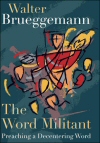
Against the easy assurance of a too-enculturated religion, Walter Brueggemann refocuses the preaching task around the decentering, destabilizing, always risky word that confronts us in Scripture—if we have the courage to hear. These powerful essays, previously available only in journals, are here combined with a newly composed preface and introduction. Includes a foreword from the Reverend William H. Willimon.
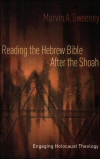
Is theology possible after the Shoah? Marvin Sweeney challenges biblical theologians to take that question with utmost seriousness. Sweeney examines often ignored biblical texts where ancient Israel contemplated the problem of apparent divine absence and “divine evil,” and finds the perspective of post-Holocaust theology an indispensable interpretive resource.
In biblical stories like those of Abraham, Moses, Jeroboam, Manasseh, Josiah, Isaiah, Ezekiel, Esther, Job, and more, Sweeney finds the recognition “that human beings cannot always depend upon God to act to ensure righteousness in the world.” The insistence, common among Holocaust theologians, that human beings must assume their own responsibility for doing justice and righteousness in the world is, Sweeney argues, powerfully present already in the Bible itself. This book is an important contribution to modern biblical theology and to Holocaust theology as well.
Marvin Sweeney examines the evidence that questions about YHWH’s fidelity in the face of evil originated with the Bible. Against the background of research on the Shoah, this synchronic analysis exposes the extraordinary effort in ancient Israel to achieve a viable theodicy.
—James L. Crenshaw, professor of Old Testament, Duke University
Marvin A. Sweeney is professor of Hebrew Bible at the Claremont School of Theology in Claremont, California. Among his recent writings are Isaiah 1-39, The Twelve Prophets, and King Josiah of Judah. He is also editor of the Review of Biblical Literature.